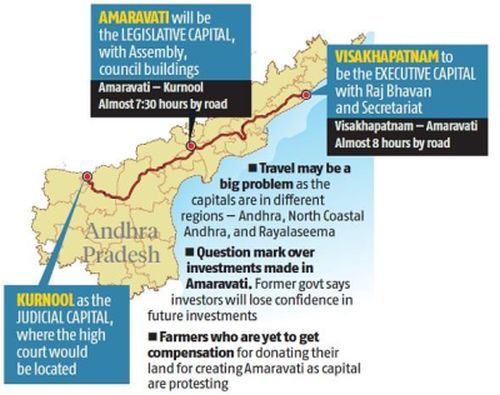 | « Back to article | Print this article |
Defending its three-capital decision, the Jagan Reddy government said since its inception in 1956 the state had failed to integrate people from all regions, reports B Dasarath Reddy.

The Andhra Pradesh government, led by Y S Jagan Mohan Reddy, on Monday moved a step closer to creating three state capitals and stripping Amaravati of the sole capital tag.
The government moved a bill in the legislative assembly to make Visakhapatnam the executive capital, Amaravati the legislative capital, and Kurnool the judicial one.
The passage of the bill was seen as a formality, as the ruling YSR Congress Party commands a strength of 151 out of 175 seats in the state assembly.
Termed Andhra Pradesh Decentralisation and Inclusive Development of All Regions Act, 2020, the bill seeks to relocate the secretariat, offices of the heads of the government departments, and Raj Bhavan to Visakhapatnam.
By becoming home to the offices of chief minister, governor and the entire top-rung of the official establishment, the port city of Vizag would become the new capital for all practical purposes.
Amaravati will be the legislative capital, housing the assembly and council buildings.
Kurnool will house the high court and other judicial institutions.
However, the cities are located in three distinct regions -- Andhra, North Coastal Andhra and Rayalaseema -- which could create problems in ease of access.
 Though it is not clear what the government intends to do with the secretariat and other government buildings in Amaravati after moving functions to Vizag, sources close to the government said these could be utilised for setting up a hospital or university.
Though it is not clear what the government intends to do with the secretariat and other government buildings in Amaravati after moving functions to Vizag, sources close to the government said these could be utilised for setting up a hospital or university.
"The health university in Vijayawada does not have its own campus even after decades. The government is also planning to start new institutions like a skill development university. So, one of these could be located in the existing secretariat complex and fully utilise the existing infrastructure," a source told Business Standard.
The high court building is expected to be utilised for the judiciary functions as the government is contemplating a high court bench in Amaravati even after shifting its base to Kurnool, sources said.
Reddy first disclosed his three-capital idea on December 17, attracting a backlash from farmers of Amaravati villages, who gave their lands for the development of the capital city in 2015 and 2016.
They fear losing the real estate value to their share of lands.
Municipal administration minister Botsa Satyanarayana has, however, announced that the period of annuity to their lands will be extended by five years in addition to the 10-year annuity promised by the previous government.
As a transitory gesture under this scheme, those who gave their lands will get a compensation of Rs 1 lakh per acre in case of a wet land and Rs 60,000 per acre in case of dry land every year.
Defending its three-capital decision, the government said since inception in 1956 the state had failed to integrate people from all regions.
Citing the Telangana movement and subsequent bifurcation as the result of this lopsided development pursued by successive governments, the state warned that history would repeat if course correction was not done.
"Article 38 of the Constitution envisages that the state shall direct its policy, among other things, towards securing inclusive development of all regions of the state. To give effect to this constitutional provision, the state is bringing forth this legislation, for distribution of all state functions among all the regions," state finance minister Buggana Rajandranath said while tabling the bill.